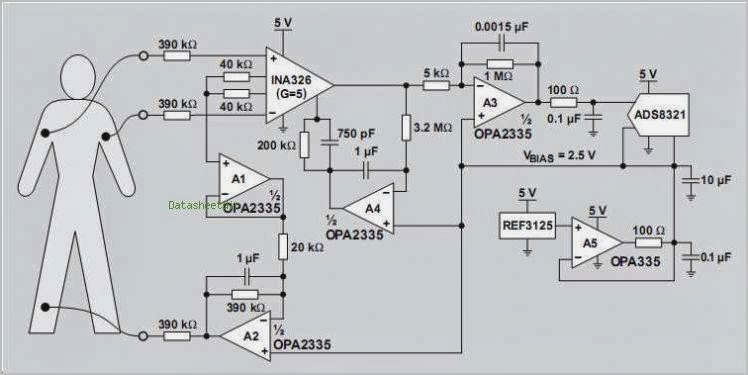ECG signals are changed from the microvolt to the millivolt range. Due to this small range, the signals measured need to be amplified in order to be better interpreted. Typical biopotential amplifiers have high input impedance and are designed for safety first.
The output impedance of the amplifier should be very low to drive any external load with minimal distortion. Again, due to the small size of the signal, the gain should be large. Typically a gain of over 1000 is implemented in biopotential amplifier circuits.
The amplifiers should have a high common mode rejection ratio to eliminate large offset signals.
Finally, most biopotential amplifiers are differential. Differential amplifiers are used to make sure that noise from the inputs are not amplified thus yielding a higher integrity signal Differential amplifiers with such characteristics are difficult to find. Thus combinations of differential amplifiers are used to construct what is called an instrumentation amplifier. A basic three-op-amp instrumentation amplifier is shown below

There are two stages for the instrumentation amplifier that help make it meet the characteristics of an ideal biopotential amplifier. The first stage is the input stage of the amplifier followed by the gain stage.
The input stage ideally supplies no common mode gain thus eliminating common mode noise. The three op-amps give the input stage high input impedance and the configuration gives a gain of
Gd = (V3-V4)/(V1-V2) = (2R2+R1)/R1
The input stage also buffers the gain stage. Finally, the outputs of the input stage are the inputs of gain stage. The gain stage has low impedance and supplies a differential gain. Overall the amplifier amplifies only the differential component with a gain of
Gd=(2R2+R1)/R1 * R4/R3
and provides a high common mode rejection ratio
OnlineResources http://www.egr.msu.edu/classes/ece480/capstone/spring13/group03/documents/ElectrocardiographyCircuitDesign.pdf
The output impedance of the amplifier should be very low to drive any external load with minimal distortion. Again, due to the small size of the signal, the gain should be large. Typically a gain of over 1000 is implemented in biopotential amplifier circuits.
The amplifiers should have a high common mode rejection ratio to eliminate large offset signals.
Finally, most biopotential amplifiers are differential. Differential amplifiers are used to make sure that noise from the inputs are not amplified thus yielding a higher integrity signal Differential amplifiers with such characteristics are difficult to find. Thus combinations of differential amplifiers are used to construct what is called an instrumentation amplifier. A basic three-op-amp instrumentation amplifier is shown below
There are two stages for the instrumentation amplifier that help make it meet the characteristics of an ideal biopotential amplifier. The first stage is the input stage of the amplifier followed by the gain stage.
The input stage ideally supplies no common mode gain thus eliminating common mode noise. The three op-amps give the input stage high input impedance and the configuration gives a gain of
Gd = (V3-V4)/(V1-V2) = (2R2+R1)/R1
The input stage also buffers the gain stage. Finally, the outputs of the input stage are the inputs of gain stage. The gain stage has low impedance and supplies a differential gain. Overall the amplifier amplifies only the differential component with a gain of
Gd=(2R2+R1)/R1 * R4/R3
and provides a high common mode rejection ratio
OnlineResources http://www.egr.msu.edu/classes/ece480/capstone/spring13/group03/documents/ElectrocardiographyCircuitDesign.pdf


Your post will be rather good, and I’m sure some will find it interesting because it’s about a topic that’s as widely
ReplyDeletediscussed as others. Some may even find it useful.Thanks so much for your post.
ALOKA UST-
5546
I think I am going to use a similar blog template to yours. I find it very attractive to the reader.
ReplyDeleteALOKA UST-9130
Good post....thanks for sharing.. very useful for me i will bookmark this for my future needs. Thanks.
ReplyDeleteToshiba PVT-375BT
ReplyDeleteThis is an informative blog by which I have got that info which I really wanted to get.
TOSHIBA PVM-375AT
Your blog provided us with valuable information to work with. Thanks a lot for sharing. Keep blogging.
ReplyDeleteTOSHIBA PVM-375AT
Great article, It's one of the best content in your site. I really impressed the post. Good work keep it up. Thanks for sharing the wonderful post.ALOKA UST-9130
ReplyDelete
ReplyDeleteGreat blog you've got here. It's packed full of lots of information!
innovative diagnostic laboratory
dialysis machine for sale
Good.
ReplyDelete